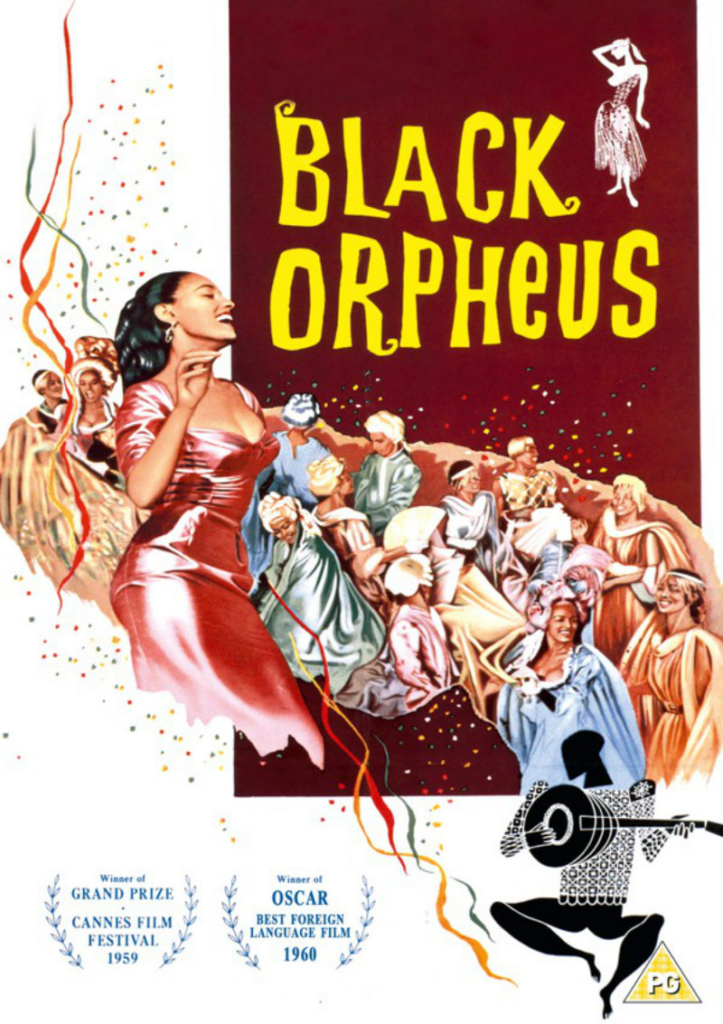BLACK ORPHEUS
(director/writer: Marcel Camus; screenwriters: Jacques Viot/based on the play Orfeu do Concercao by Vinicius de Moraes and Antonia Carlos Jobim; cinematographer: Jean Bourgoin; editor: Andree Feix; music: Luiz Bonia/Antonia Carlos Jobim; cast: Breno Mello (Orpheus), Marpessa Dawn (Eurydice), Lea Garcia (Serafina), Lourdes de Oliveira (Mira), Jorge de Santos (Benedetto), Waldetar De Souza (Chico), Alexandro Constantino (Hermes), Adhemar Da Silva (Death); Runtime: 100; MPAA Rating: PG; producer: Sacha Gordine; Janus/TCM; 1959-Brazil/France/Italy-in Portuguese with English subtitles)
“A colorful costumed Brazilian musical.”
Reviewed by Dennis Schwartz
French director Marcel Camus (“Gold of the Amazon”/”Atlantic Wall”) directs his only hit film, a popular eye-catching photographed film that’s a colorful costumed Brazilian musical (introducing the Bossa Nova on the world stage) and playing in the background Samba music throughout. It’s based on the ancient Greek myth of the love story between Orpheus (Breno Mello, soccer player) and Eurydice (Marpessa Dawn), but changes the location and the way events unfold.
It’s adapted from the Brazilian playwright Vinicius de Moraes’s reinvented version of the myth and the play he wrote with the composer Antonia Carlos Jobim, Orfeu do Concercao. It’s shot on location at the Rio Carnival, and has a large ensemble cast that’s a mixture of musicians, professional actors and non-professionals. The vibrant film romanticizes the life of the poor blacks who live happily through their bouncy Latin music in the slums called the favelas, located in the hills above Rio.
The lover-boy guitar-playing Orpheus is a tram conductor in Rio de Janeiro engaged to the feisty, possessive and jealous Mira (Lourdes de Oliveira, American born).
Orpheus meets on his tram the beautiful young and innocent country gal Eurydice, who is visiting her cousin Serafina (Lea Garcia) for the Carnival week. She’s also hiding from a mysterious skeleton death masked stranger she claims is trying to kill her since she got to Rio. Orpheus falls in love with her at first sight, and he becomes her protector as he dumps the embittered Mira. The two are together during Carnival.
When Eurydice is accidentally electrocuted on the tram cable wires, Orpheus tries to bring her spirit back to life as he goes into the Underworld and searches for her body at the Missing Persons Department.
The overlong first-half tries to loosely mimic a Hollywood musical, while the darker second half has a surreal Underworld look. The arthouse film, despite several clever turns, never rises above a sparkling mainstream production that pales when compared to the arty masterpiece of the Jean Cocteau 1950 version of Orpheus.
However, the film won an Oscar for Best Foreign Film.
It played at the Cannes Film Festival, where it won first-prize.

REVIEWED ON 6/29/2025 GRADE: B-
dennisschwartzreviews.com